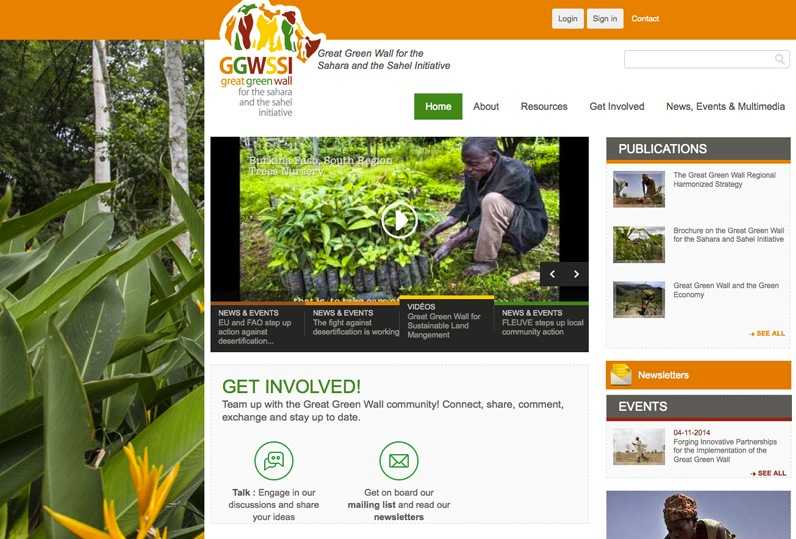
The Great Green Wall Initiative for the Sahara and Sahel (GGWSSI) – Africa’s flagship initiative in fighting poverty, climate change and natural resource degradation – has launched a dedicated online knowledge platform.

The Great Green Wall Initiative for the Sahara and Sahel (GGWSSI) – Africa’s flagship initiative in fighting poverty, climate change and natural resource degradation – has launched a dedicated online knowledge platform.
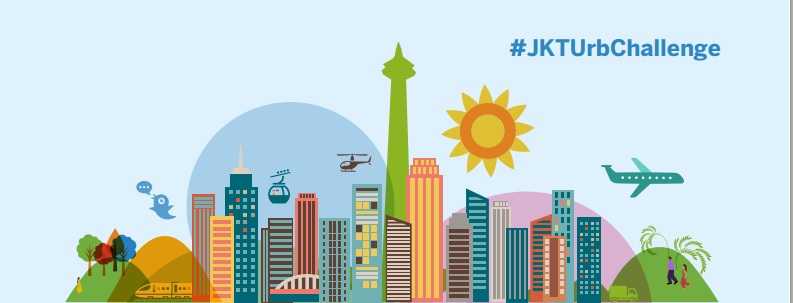
The New Cities Foundation and Connect4Climate announced the names of three outstanding project ideas that made it to the final stage of the Jakarta Urban Challenge.
<p>· 1. <strong>Cyclist Urban System</strong>: A plan to create dedicated “cyclist hubs” across Jakarta, where cyclists can park their bikes, get dressed, buy refreshments, repair their bikes, obtain first aid assistance and route information, and eventually, rent bikes.</p>
<p>· 2. <strong>Jalan Aman (Safe Passage)</strong>: A mobile application that focuses on the safety of female commuters, allowing users to share their location, report incidences of assault and access information on safe transportation options from other users.</p>
<p>· 3. <strong>Squee Mobile App</strong>: A sharing app that unifies pedestrians and cyclists to travel together on shorter, safer non‐motorized routes across Jakarta's urban kampongs (villages).</p>
<p>The three finalists will be invited to present their projects to an audience of 800 urban leaders and thinkers from around the world at the <strong>New Cities Summit</strong>, which is taking place for the first time in Jakarta on June 9 - 11. Each finalist will have five minutes to present their idea on the main stage and inspire the audience and impress the judging panel. The winner will be selected by a prestigious panel including <a href="http://www.muhammadyunus.org/" target="_blank">Muhammad Yunus</a>, Nobel Prize recipient and Founder of the Grameen Bank; and Sutanto Soedodho, Jakarta's Deputy Governor for Industry Trade and Transportation.</p>
<p>The winner will receive $10,000, while the second and third runners-up will receive $6,000 and $4,000 respectively. All three finalists will use the money to implement their projects in Jakarta.</p>
<p><a href="/sites/default/files/upload/Jakarta%20Urban%20Challenge%20FINAL.pdf" target="_blank">Download the press release on the finalists and competition</a>.</p>
The Climate Institute recently published the report “Sport & Climate Impacts: How much heat can sport handle?”.
[video:https://vimeo.com/106893756?byline=0]
The world's largest climate march calls for action on climate change. On September 21 about 400,000 people marched in New York and in more than 150 other countries for the global call for climate action. Rachel Kyte, Vice President and Special Envoy for Climate Change, World Bank Group, joined the march with the Connect4Climate team, as did a number of celebrities, and influential leaders. See more here.
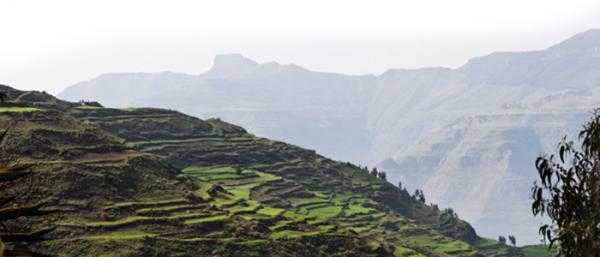
The 2014 World Day to Combat Desertification global observance event focused on the theme of ecosystem-based adaptation, with a rallying call “Land Belongs to the Future – Let’s Climate Proof It.” Approximately 400 representatives from government, intergovernmental and civil society organizations (CSOs) registered for the event, which took place on Tuesday, 17 June 2014, at World Bank headquarters in Washington, DC, US. The event was also webcast, and speakers responded to questions from a global audience. The United Nations Convention to Combat Desertification (UNCCD) organized the event, which was hosted by the World Bank in partnership with the Global Environment Facility (GEF), TerrAfrica and Connect4Climate.
On the twentieth anniversary of the adoption of the UNCCD, speakers at the global observance event considered the requirements for ecosystem-based adaptation to address issues related to desertification, land degradation and drought as well as shared successful cases of combating desertification in drylands. Keynote speakers discussed national efforts, and panelists presented research and lessons learned to address land degradation and foster adaptation and resilience. Two short films were screened, demonstrating additional projects and lessons learned. The Land for Life award winners were also announced. This briefing note summarizes the event’s proceedings.
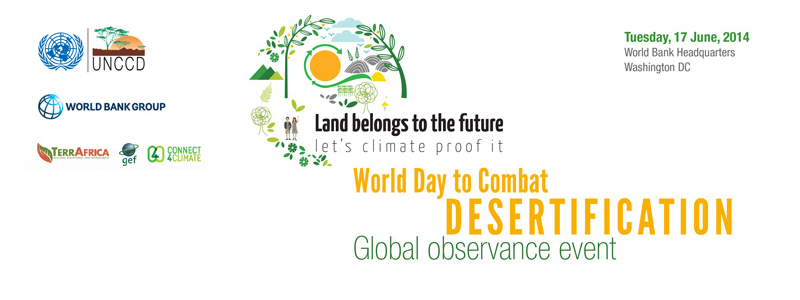
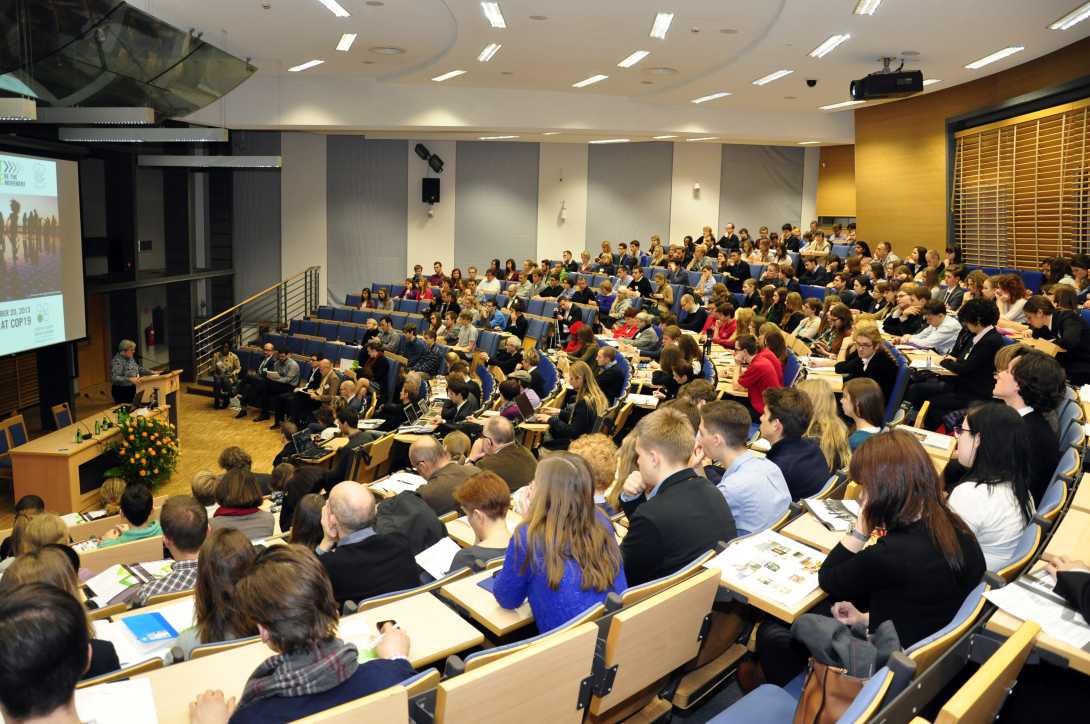
Climate Week NYC continues in New York and Rachel Kyte, World Bank's Vice President of Sustainable Development, just posted a blog outlining the main themes surrounding all the action in the Big Apple. With so many high level dignitaries decending on one city to discuss the world's sustainable future, it is not hard to guess that there are complex array of themes to address:
Tuesday, hosted by Bloomberg L.P., I was in conversation with Commissioner Connie Hedegaard and Cristiana Figueres. The discussion covered the role of the UNFCCC past, present and future in what has happened and needs to happen to arrest climate change. From the need to change the narrative, accounting systems, risk appetites and ambition, to whether the convention is an umbrella for action, or should encourage actions outside its framework, to where will the funding come from for adaptation and resilience as climate change bears its teeth, it was a great conversation showing sensible hope.
Maximizing the agility of the private sector as key partners in the fight against climate change seemed to be an underlying theme of the conference. The marriage of policy, public funding and private sector "smart" investments could prove to be a game-changing climate strategy. We are also thrilled to see London-based Climate Group, a Connect4Climate partner, get a mention for their campaign efforts.
Unlocking private sector investment is key.
Smart companies, many of them in the room at Climate Week, are not waiting for an international agreement. We can see market leaders in almost all sectors storming ahead in the way in which they think about operating in a world where we need more mitigation action, but also increasingly thinking through the risks of adaptation to their business models in every sector of the economy
Going forward, it’s important that we find the best examples of regulation and legislation that really support risk taking and innovation in the private sector, celebrate it, and reward it, in real time, here and now, with access to long term affordable capital.
This is where I believe the ideas and alliances formed by the Climate Group’s Clean Revolution campaign can really help.
The whole blog post is worth a read. Check it out here on the World Bank Blog.

COP 21, in December 2015, will be a unique opportunity to bring climate change to the main stage. Driven by EcoAct, one of the global leaders in climate change economy, Cap COP21 is an open and proactive initiative for the climate.
Cap COP21 aims at fostering the emergence of concrete, innovative and collaborative solutions for climate by implementing:
1. Professional and collaborative events to imagine realistic actions for the XXI century
2. A Europe-wide Survey on the perception of climate change issues among European citizens
Relive the launch of Cap COP21 here and discover all the videos available so far on our YouTube Channel!
Willing to join us and contribute concretely to COP21? Book in for our next event, June 23rd in Paris:
Climate Innovation Day: Tuesday, June, 23rd 2015 - 9 am to 6 pm at the Pan Piper (Paris)

Attend the Climate Talks to discover innovations for the climate and take part in the Workshops to reflect on practical solutions!
Climate Talks will bring researchers, innovators and project leaders to the main stage, and give evidence of present and future innovations for the climate. Dynamic, creative and hopeful, these Climate Talks will offer an opportunity to discover and discuss pioneering approaches which disrupt climate status quo.
To discover each speaker’s intervention, register to attend the event (registration is free but mandatory)!
Afternoon Workshops will gather attendees together in various working groups, in which they will draft practical solutions for the climate. Around a table, participants will work as a team on a precise topic, and intend to bring forth realistic answers to face climate challenges. These conclusions will contribute to a Proposals Document, which will be revealed at the Grand Palais during COP21. You too, experience what innovation can offer for the climate!
The topics will address main contemporary issues, such as Energy Transition, Climate Risk orBusiness-Local government cooperation, as well as tools to fight climate change, such as domestic offsets, green investments or carbon market.
Where? At the PAN PIPER (2-4 Impasse Lamier - 75011 PARIS)
More info: www.cap-cop21.com | communication@cap-cop21.com | + 33 (0) 6 09 72 53 44
Recognised as one of the world’s leading experts in this area, EcoAct provides consulting services and support to climate change economy pioneers to reinforce their competitiveness. EcoAct works with multinationals, small and medium businesses, and local governments with setting up carbon strategies, CSR policies and eco-innovation approaches.
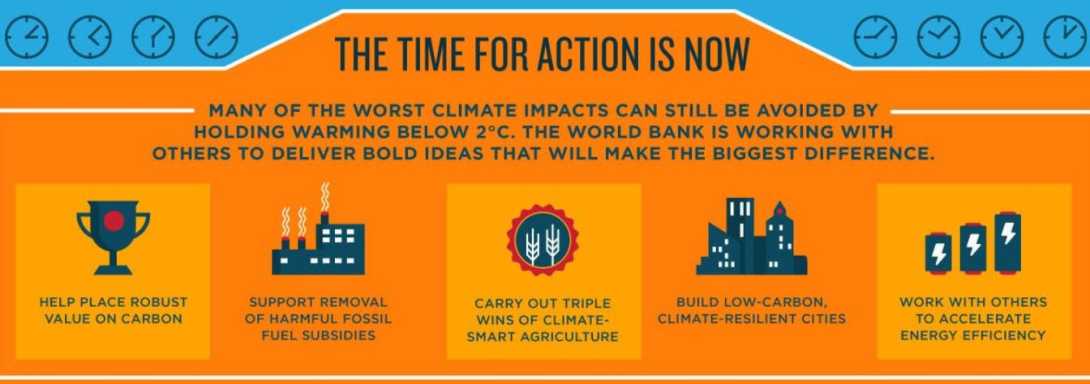
Regular food shortages in Sub-Saharan Africa….shifting rain patterns in South Asia leaving some parts under water and others without enough water for power generation, irrigation, or drinking….degradation and loss of reefs in South East Asia resulting in reduced fish stocks and coastal communities and cities more vulnerable to increasingly violent storms….these are but a few of the likely impacts of a possible global temperature rise of 2 degrees Celsius[1] in the next few decades that threatens to trap millions of people in poverty, according to a new scientific report released today by the World Bank Group.
Down the Heat: Climate Extremes, Regional Impacts, and the Case for Resilience builds on a World Bank report released late last year, which concluded the world would warm by 4 degrees Celsius[2] (4°C or 7.2 degrees Fahrenheit) above pre-industrial levels by the end of this century if we did not take concerted action now. This new report looks at the likely impacts of present day, 2°C and 4°C warming on agricultural production, water resources, coastal ecosystems and cities across Sub-Saharan Africa, South Asia and South East Asia.
"This new report outlines an alarming scenario for the days and years ahead – what we could face in our lifetime," said World Bank Group President Jim Yong Kim. "The scientists tell us that if the world warms by 2°C -- warming which may be reached in 20 to 30 years -- that will cause widespread food shortages, unprecedented heat-waves, and more intense cyclones. In the near-term, climate change, which is already unfolding, could batter the slums even more and greatly harm the lives and the hopes of individuals and families who have had little hand in raising the Earth's temperature."
"These changes forecast for the tropics illustrate the level of hardships that will be inflicted on all regions eventually, it we fail to keep warming under control," Kim said. "Urgent action is needed to not only reduce greenhouse gas emissions, but also to help countries prepare for a world of dramatic climate and weather extremes."
The report, prepared for the World Bank by the Potsdam Institute for Climate Impact Research and Climate Analytics, reveals how rising global temperatures are increasingly threatening the health and livelihoods of the most vulnerable populations, crucially magnifying problems each region is struggling with today.
Turn Down the Heat: Climate Extremes, Regional Impacts, and the Case for Resilience is an analysis of the latest climate science, as a means to better understand the risks of climate change to development. Key findings include:
In Sub-Saharan Africa, by the 2030s droughts and heat will leave 40 percent of the land now growing maize unable to support that crop, while rising temperatures could cause major loss of savanna grasslands threatening pastoral livelihoods. By the 2050s, depending on the sub-region, the proportion of the population undernourished is projected to increase by 25-90 percent compared to the present.
In South Asia, the potential change in the regularity and impact of the all-important monsoon could precipitate a major crisis in the region. Events like the devastating Pakistan floods of 2010, which affected more than 20 million people, could become common place. More extreme droughts in large parts of India could lead to widespread food shortages and hardship.
Across South East Asia, rural livelihoods are faced with mounting pressures as sea levels rise, tropical cyclones increase in intensity, and important marine ecosystem services are lost as warming approaches 4°C.
And across all the regions, the likely movement of impacted communities into urban areas could lead to ever higher numbers of people in informal settlements being exposed to heat waves, flooding, and diseases.
The report says impacts across its study regions are potentially devastating. And, if warming goes from 2ºC to 4°C, multiple threats of increasing extreme heat waves, sea–level rise, more severe storms, droughts and floods would have severe negative implications for the poorest and most vulnerable. It notes, however, that many of the worst consequences could still be avoided by holding warming below 2ºC.
"I do not believe the poor are condemned to the future scientists envision in this report. In fact, I am convinced we can reduce poverty even in a world severely challenged by climate change," President Kim continued. "We can help cities grow clean and climate resilient, develop climate smart agriculture practices, and find innovative ways to improve both energy efficiency and the performance of renewable energies. We can work with countries to roll back harmful fossil fuel subsidies and help put the policies in place that will eventually lead to a stable price on carbon."
See the full infographic from the World Bank.
"We are determined to work with countries to find solutions," Kim said. "But, the science is clear. There can be no substitute for aggressive national mitigation targets, and the burden of emissions reductions lies with a few large economies."
The report says sea level rise has been occurring more rapidly than previously projected and a rise of as much as 50 cm by the 2050s may already be unavoidable as a result of past emissions. In some cases, impacts could be felt much earlier. For example, without adaptation measures, sea level rise of 15 cm, coupled with more intense cyclones, threatens to inundate much of Bangkok by the 2030s.
The burgeoning cities of the developing world are identified as some of the places on the planet most at risk from climate change. Describing urban areas as "new clusters of vulnerability," the report says urban dwellers, particularly the urban poor, face significant vulnerability to climate change.
Informal settlements in places like Metro Manila in the Philippines and Kolkata in India concentrate large populations and often lack basic services, such as electricity, sanitation, health, infastructure, and durable housing. In such areas, people are highly exposed to extremen weather events, such as storms and flooding. Extreme heat is also felt more acutely in cities.
Partly in response to the findings of the two Turn Down the Heat reports, the World Bank Group is stepping up its mitigation, adaptation, and disaster risk management work, and will increasingly look at all its business through a "climate lens."
Today, the Bank is helping 130 countries take action on climate change. Last year, it doubled its financial lending that contributes to adaptation. Increasingly, the Bank is supporting action on the ground to finance the kind of projects that help the poor grow their way out of poverty, increase their resilience to climate change, and achieve emission reductions.
[1] 2 degrees Celsius = 3.6 degrees Fahrenheit
[2] 4 degrees Celsius = 7.2 degrees Fahrenheit
You can download the full report here.
Hosted by the World Bank Group and supported by Italy’s Ministry of the Environment and Energy Security and Germany’s Federal Ministry for Economic Cooperation and Development, Connect4Climate (C4C) is a global partnership for a livable planet that connects, creates, and communicates to build long-lasting change for future generations.